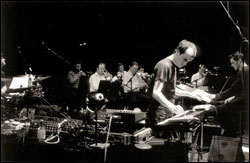It’s a stretch to privilege any variation on the ages-old “What is jazz?” question as even close to interesting in 2003. So what is Matthew Herbert, arguably the most interesting auteur in dance music, doing by forcing it on us now? In part, he’s lamenting his medium’s divorce from musicianship and all it ever came to mean. Or maybe he’s goading a complacent audience to treat jazz as more than a lifestyle accessoryor daring a progressive one not to. Or setting pronounced political designs on a big-band backdrop dripping with wartime signifiers. Or just seeing how many responses can be incited without directly stating a question.
All of which apply just fine to the Matthew Herbert Big Band’s new Goodbye Swingtime (Soundslike), but the truth lies closer to Herbert simply being Herbert. What that’s meant over the past few years courts and resists grand pronouncements with equal sway. It’s reductive to call Herbert the most inventive production mind in electronic music, but few others could fill a double-disc set of remix work with as many ideas as he did on last year’s Secondhand Sounds. His tweaks are subtle and less than immediately wowing, but his mannerism is all the more complex for its approachability. Herbert’s formula, as it were, is simple: Rub down the bass line with a few more melody-minded notes than necessary, shave and fatten the hook with a naturalism that makes people talk seriously about dynamics, smear the build into something too fidgety to be heard as programmatic, and raise all such small ships on a sea of beats that churn and burble like molecularly restless wave foam.
Herbert’s roots are in house music, which he helped revive in mid-’90s England with his minimalist/maximalist approach. His name-making work (released under the mantles Herbert, Doctor Rockit, Wishmountain, and Radio Boy) was built around organic musique concr败 samples of everyday objects (golf balls, cheese graters, toasters)and his innate ability to craft small-scale grooves from whatever sounds he could get his mixer on signaled his drive to treat house as art music. That might sound dry or paradoxical, but Herbert’s funk didn’t preclude experimentalism, nor vice versa. Just try to turn away from the shape-shifting majesty of his 2000 DJ mix on Tresor, Globus Mix Vol. 5: Lets All Make Mistakes, a must-hear for anyone intrigued by the notion of house’s ability to make brains go hot but as yet unconvinced in physical fact. Deliriously tight but inspired enough to mess up when its ears grow bigger than its headphones, Mistakes makes a virtuoso-luring instrument not just of records and turntables but of the entire idea of dance music. That’s Herbert’s rarity: He’s a content provider in a world that’s mostly given to charts and graphs.
GOODBYE SWINGTIME comes with lots of content to weigh in or toss out. Among the album’s processed sound sources are thumbed copies of Noam Chomsky’s Rogue States, crumpled clippings of Iraqi war news, keyboard clackings from protest-minded Web sites, and phone books dropped by Herbert fans across the world. The liner notes catalog all the sources, but they don’t address the fact that none of the expressly political cues is hearable as what it is. It’s a curiously ambiguous choice for an outspoken antiwar crusader . . .
. . . but so is starting an album with starry-eyed big-band swing and then jamming it against a singer swooning, “Everything’s changed,” without letting on to whether he finds that sad or empoweringor even whether he’s singing about music, politics, love, whatever. Herbert pitches Goodbye Swingtime as a pointedly political record on his manifesto-laced Web site (www. magicandaccident.com), but the only immediate political statement comes by way of its jazzread: not dancemakeup. The album makes a hyperliteral show of its big-band conceit, shifting through sumptuous horn charts and torch-song vocals that only occasionally get reconfigured by Herbert’s electronic hand. Casual jazzbos might not know much of Swingtime from Charles Mingus or even Duke Ellington, but woven into its big-band retreads are signs and sighs that put Herbert’s suggestive genre-switch to work.
Sung by a shifty cast of vocaliststechno soul-boy Jamie Lidell, smoky chanteuse and regular Herbert collaborator Dani Siciliano, and art-rock heavy Arto Lindsay among themSwingtime reveals its political aims through songs that work hard to conceal their resolution. “Chromoshop” signals the tone with its innocuous presentation of lines like “Freedom slipping, feel the product pull/See through mirrors, tiny cameras/They have tricked us.” The words are sharp, but their anachronistic surroundings and romantic vocal delivery shroud them in a blurry veil. Elsewhere Siciliano coos, “Each name a warning/My handout holding/This click foreboding/Ears should be burning/We should be learning . . . this.” As it surfaces through the album, this means pretty much everything going on in the world right nowit’s a pointedly vague stand-in for a current affliction as hard to name as it is to comprehend.
There’s something sheepish about Herbert’s wishy-washy vagary, but what at first sounds like a disappointing lack of rhetorical charge grows into a suggestive read of the politics of frustration, exhaustion, anguish, and ire. The album’s soft sounds make its hard barbs linger more than protrude. The mood calcifies as Swingtime trades its early jazz faith for increasingly fractured cut-up mosaics like “The Many and the Few,” a soulful finger-snap bumper that hides in its glide a coarse reminder: “In the hole of the plan, you’ll be feeling all the shit from the fan.” It’s an ugly sentiment that stings stronger because of the big-band amber it’s preserved in.






